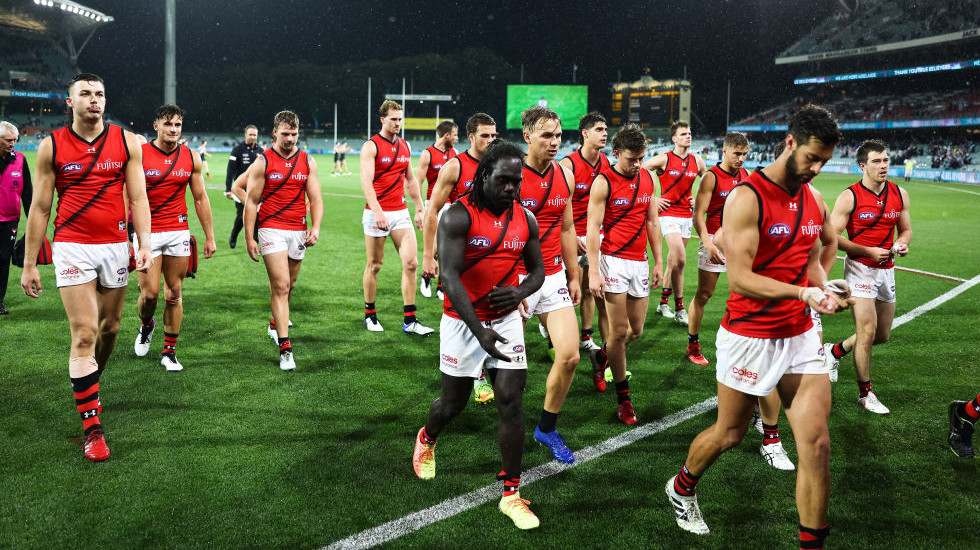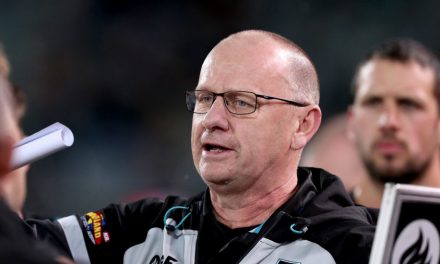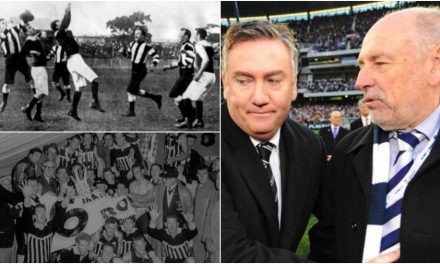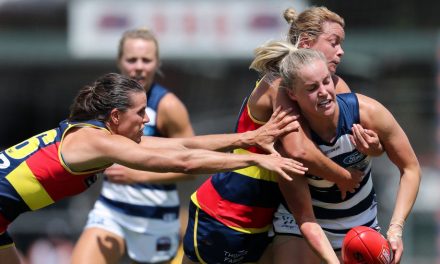Another heavy defeat. Essendon leaves the field after a thrashing from Port Adelaide last weekend. Photo: GETTY IMAGES
“Blessed is he who expects nothing, for he shall never be disappointed.” – Alexander Pope
As another season of unfulfilled promise and bruising setbacks closes on Essendon, head coach John Worsfold has increasingly carried the can for failure.
The stress has shown as the commentary barbs fly. From contender to carcass in the blink of an eye, the frustration of missing finals is re-opening fault lines seemingly on a daily basis.
Past players sound off, the media pack swarms, coteries snipe and snarl and the current list fragments – Conor McKenna gone, Tom Bellchambers retired and the likes of Adam Saad, Joe Daniher and Orazio Fantasia considering their options.
The coaching succession ideal, with assistant Ben Rutten to fully take charge next season, has proved cumbersome and controversial. Steps to shift to a much-touted “Richmond style” game plan, or reversions to other plans, have not paid dividends.
Indeed, if accounts of on-field bickering are to be given credence, it would appear the playing group itself is unsure of which plan to employ.
Following another car crash loss last weekend, an exasperated Worsfold was at pains to put some distance between himself and the club. The expectations around Essendon, he strongly implied, do not meet reality.
“Essendon people think Essendon should be better,” he said. “[But] no one team has any more right to be successful quicker than any other team just because they’re a big-name club.”
That’s all well and good, but Worsfold, along with list manager Adrian Dodoro and two footy managers – Rob Kerr until early 2018 and Dan Richardson since – made the decisions to repeatedly give up first-round draft picks to bring in “top up” talent in the quest for September success.
Granted, a woeful run with injuries has curbed Essendon’s chances of stable selection this season. Furthermore, the number of games in northern Australia – going from the dry delights of Docklands to the tempestuous tropics – has impeded the forward handball style of play or the more conservative keepings-off game played out wide and down the line.
But other clubs have adapted better. Much better.
In terms of goals scored, the Bombers rank fifth-last in the competition. No one at Essendon has kicked more than 19 goals across the 16 completed games. Percentage is fourth worst and only cellar dweller Adelaide has suffered heavier defeats than the Bombers in 2020.
Yet this is a team routinely spruiked as a finals contender and a major power in the AFL. It is difficult to think of another AFL club whereby the expectations of success are so often out of alignment with the shortcomings of its list and playing style.
PLEASE HELP US CONTINUE TO THRIVE BY BECOMING AN OFFICIAL FOOTYOLOGY PATRON. JUST CLICK THIS LINK.
And what of the man steering the ship? What will be his legacy?
For my most recent book, I was granted a tour of the impressive Tullamarine facility and then sat face-to-face for an hour with Worsfold. He was open, unfailingly courteous and did not hesitate for a moment with his responses.
He firmly believed that his playing and coaching days at West Coast, and the challenges that accompanied his career, provided the foundation for him to help the Bombers recover.
“I’d seen a lot – a club starting up, a club that was nearly broke, learning about travel, sacked coaches [and] cultural issues,” he said, “so I wasn’t coming to a place that was going to shock me.
“I knew what needed to happen to get a footy club steady and running well. I wasn’t worried about coming here and not getting a good coaching record. It was about getting the Essendon Football Club rock solid again.”
On that count, and some are quick to forget how deeply scarred the Bombers were on and off the field in the wake of the supplements scandal, Worsfold served admirably as a catalyst and public face for reunification and stability.
But recruiting grabs and draft deals came at the expense of regeneration; only three of Essendon’s youngsters made their AFL debut this season (Brisbane, Collingwood and GWS had six and the Western Bulldogs and West Coast five by way of a brief comparison).
Confusion over tactics hasn’t helped, with the devolution of coaching responsibility a probable factor, likewise the lack of impact of the hoped-for quick fix of nabbing talent from other clubs.
Worsfold’s record has indeed suffered in the process. In home and away fixtures, his winning rate as coach of West Coast was 54.2 per cent. At Essendon, after 104 games in charge, it is a lowly 43.6 per cent, although his first year at the helm, 2016, should be regarded as a statistical outlier.
Perhaps all along, though, there was a clue, a difference in what was touted publicly and what became the intent within the four walls.
“Outwardly, you say we want to become a great footy club,” Worsfold told me two years ago. “We want to win another premiership. Our vision is to be the most respected, inclusive and successful sporting club in Australia. But for me, I want our players to enjoy playing footy, because I know it’s the best time of your life.
“Looking from afar, I felt sorry for them.”
On that count, we must question the legacy. For all the bells and whistles at Tullamarine, the Bombers are a long way from flying.












As a 59 year Essendon member I have seen this once great club at its highs and at its lows. The one thing that has been a constant even through the drug saga, is a deep connection between members,supporters and the club.
This club needs a toe cutter as President al la the late Graham McMahon.
In many ways the club has had a monumental task to repair but it is now time to become ruthless and single minded or a generation of Bomber fans will be lost.
Couldn’t agree more and I would have loved an even deeper dive into the recruitment strategy which in my opinion sits at the heart of the club’s inability to be competitive. I have been flamed in various Essendon fan forums for not getting onboard the “Thank You Woosha” bandwagon. I am not intending to denigrate his role in 2016 but let’s be honest, the players had been cleared of the ASADA charges when he agreed to the position and it was only in January the following year that the player bans were handed down by CAS. So while the club had gone through some very challenging times from 2013 to 2016, Worsfold took on the job believing there would be a degree of ‘clear air’. It is also my view that he was one of many coaches who could have achieved a satisfactory outcome in 2016. The pressure was off, there was no expectation with regards to win/loss and he could play the kids without ramifications.
But ok, let’s give him a tick for that year. What was to follow however was three years of treading water and despite being handed high quality trades such as Saad, Stringer, Shiel and Smith, the team in reality went backwards, the game plan failed to hold up and inconsistency became endemic. The injuries to Daniher and Fantasia were no doubt a set back but blaming them for a lack of development and progress would be hiding from reality. Anyone who has followed the Bombers for the last few years can see that the problems were not the loss of Daniher, although no doubt that compounded the issues, the problem was a complete disconnect between the coaching, game day strategy, selection, recruitment and what the players did on the field. You could tell if the team was up within the first few minutes of any game. The mental brittleness of this side is staggering. I have lost count of how many times we have got out to a 27 point lead only to be pulled in by a rampant opposition to either lose or win by a matter of points. The lack of clarity in the coaching and ability to build a suitable game plan to deal with fluctuating circumstances during these games was apparent. I believe Worsfold’s ‘ Let’s just go out and have fun’ mantra is central to this mental weakness. The players affected by the saga bans numbered around 5 in his three seasons. Why then mollycoddle the rest of the squad with a soft touch, she’ll be right approach. This club needs hardness and clear direction, the reward will be success which is what makes the game fun. Winning. Brendan Goddard could see it. He and he alone was aghast at the soft, laziness of this team and I for one don’t blame him for flinging the pretzels to the floor at half time.
You’ve made some terrific points there. IMO (not speaking for Elliot) there’s problems (culturally and structurally) with the club which will impact on whatever happens on field (even if that is managed better) until they are sorted out. Can they be? Only with an enormous concerted effort, and a collective realisation of where the club is at (and I’m sceptical about them being anywhere near that point, sadly).
I agree with many of your points and in particular the mental toughness of the playing group leaving much to be desired. Young men earning big money to play at an elite level need to have it firmly instilled in them by tough but fair coaching staff. That mental toughness is where it starts. The idea of having fun should mean having fun when you win.
Looking back a couple of years to 2018 when we came storming home and missed finals by 1 match in great respect because of the loss to the bottom dweller Carlton earlier that year was about the only real high point in my opinion in the last 5 years.
There was much hype at the end of the year about what 2019 would bring. Teams we were clearly better than at the time such as Port Adelaide and Brisbane were not considered to be chances in the coming few years. We were talking up our young list and what it would bring and soon.
Well where are we now and why are Brisbane and Port right up there and we not?
Could Hinkley and Fagan as compared to Worsfold/Rutton be the difference? Are their football departments and management foresight better?
In my opinion yes and yes because they are tougher and have understood that to be in the top 4 you need mental and physical toughness to play 4 quarters of football week in and week out.
Let’s hope Truck and co get this and get it quickly. If not we are doomed to more mediocrity for some years to come.
Nicely balanced article. This is why I pay for Footyology.
Thanks for the feedback, David. I appreciate it and I’m sure Rohan does as well.